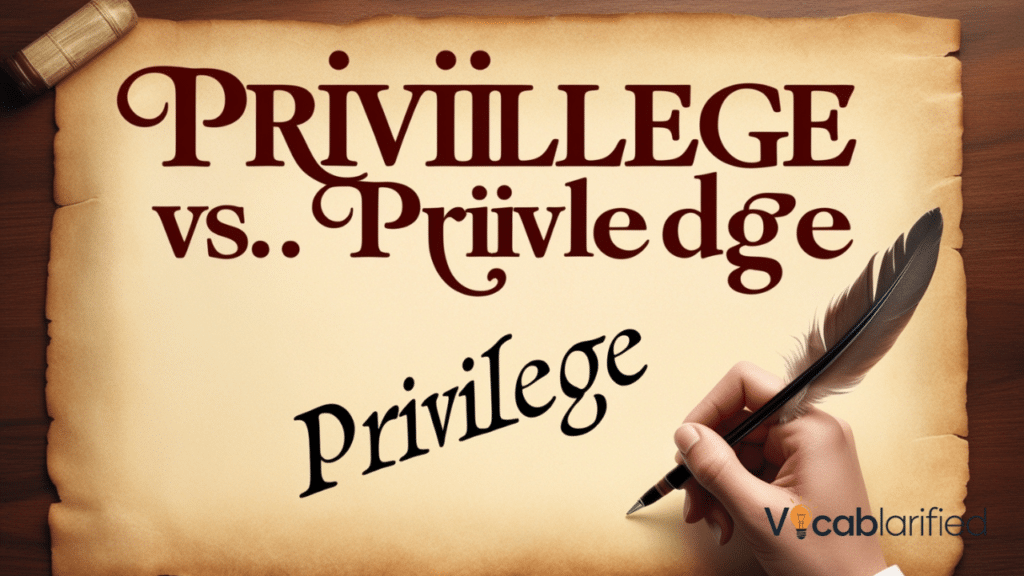In the vast landscape of the English language, certain words consistently trip up even the most seasoned writers.
One such word that often causes confusion is “privilege.” The struggle between “privilege” and “priviledge” has led many to question which spelling is correct.
Unveiling the Truth
Let’s cut to the chase:
The correct spelling is “privilege.” This word, derived from Latin, has maintained its spelling integrity throughout centuries of usage in English. However, the misspelling “priviledge” remains a common error.
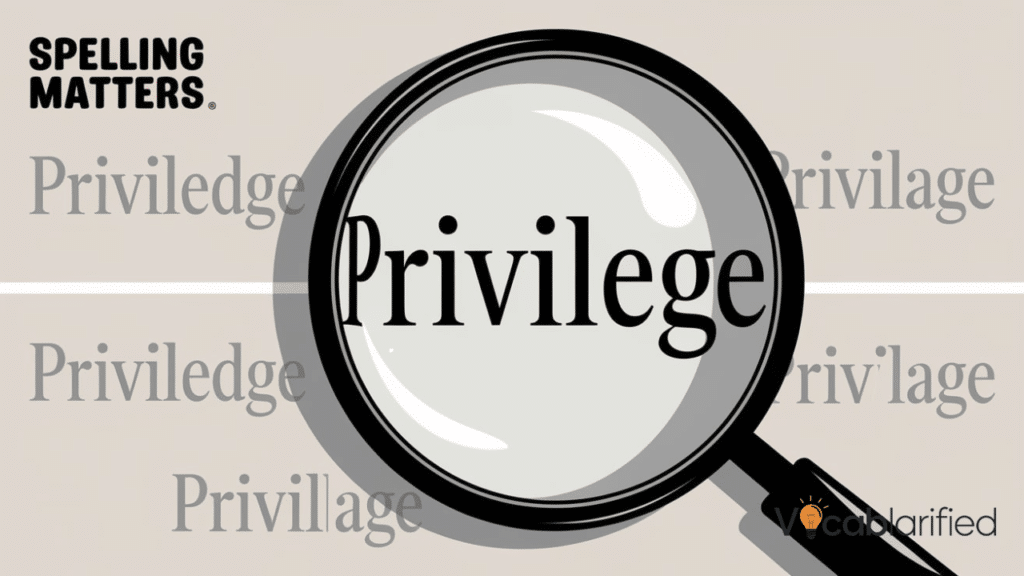
Why the Confusion?
The prevalence of this misspelling stems from several factors. English is notorious for its spelling irregularities, and “privilege” doesn’t follow the typical “-edge” pattern seen in words like “knowledge” or “pledge.”
Impact of Misspelling
Using the incorrect spelling can have consequences beyond simple embarrassment. In professional settings, such errors can undermine credibility and create a negative impression.
Consider this email scenario:
To: hr@company.com From: john.smith@email.com Subject: Request for Special Consideration
Dear HR Department,
I am writing to inquire about any special priviledges that may be available to long-term employees. As I approach my 10-year anniversary with the company, I was wondering if there are any additional benefits or considerations I might be eligible for.
Thank you for your time and consideration.
Best regards, John Smith
In this example, John’s misspelling of “privilege” could potentially undermine his request and create a less favorable impression.
You Might Also Like This: Onsite Or On-Site: Understanding The Key Differences
Understanding the Word
To truly grasp the correct usage and spelling of “privilege,” it’s crucial to understand its meaning and etymology.
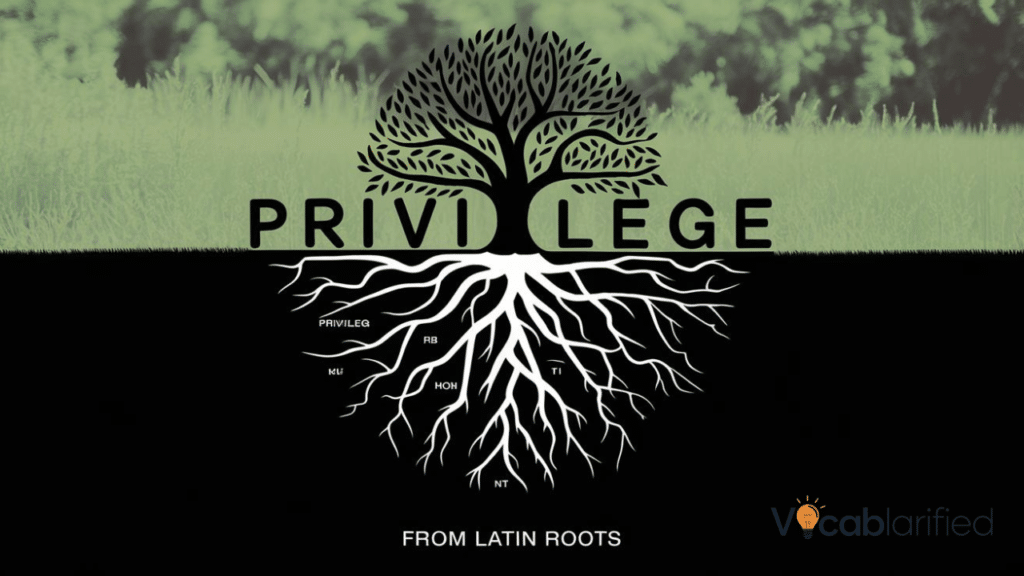
Definition and Origin
“Privilege” refers to a special right, advantage, or immunity granted or available only to a particular person or group. Its roots trace back to the Latin “privilegium,” meaning “law for or against a private person.”
Usage in Context
Understanding how to use “privilege” correctly in various contexts can help reinforce proper spelling. Here’s a table showcasing different usages:
| Context | Example Sentence |
|---|---|
| Legal | The attorney-client privilege protects their communications. |
| Social | His wealth and status afforded him many privileges. |
| Technology | Admin privileges allow full access to system settings. |
| Education | Students with learning disabilities may receive testing privileges. |
| Workplace | Executive privileges include a company car and extended vacation time. |
| Historical | The nobility enjoyed numerous privileges denied to commoners. |
| Personal | I consider it a privilege to be your friend. |
| Political | Diplomatic immunity is a privilege granted to foreign officials. |
| Sports | Season ticket holders enjoy special privileges at games. |
| Financial | Certain credit cards offer travel privileges to cardholders. |
Common Misspellings
While “priviledge” is the most frequent misspelling, other variations exist. Here’s a table of common errors:
| Misspelling | Correct Spelling |
|---|---|
| Priviledge | Privilege |
| Privilage | Privilege |
| Privelege | Privilege |
| Privilige | Privilege |
| Privlege | Privilege |
| Priviledged | Privileged |
| Privilaged | Privileged |
| Priveleged | Privileged |
| Priviliged | Privileged |
| Privleged | Privileged |
The Importance of Correct Spelling
In an age of autocorrect and spellcheck, one might wonder why correct spelling still matters. The truth is, proper spelling remains crucial in many aspects of life.
You Might Also Like This: Using Or Useing: Common Spelling Mistake Explained
Professional Impact
In professional settings, correct spelling can make the difference between success and failure. Whether you’re writing a cover letter, sending a business proposal, or communicating with clients, proper spelling demonstrates attention to detail and professionalism.
Academic Significance
In academia, correct spelling is often tied to grades and credibility. Students who consistently misspell words may find their work marked down, regardless of the quality of their ideas.
Digital Communication
Even in casual digital communication, correct spelling can affect how others perceive you. In a world where first impressions are often made through text, proper spelling can enhance your digital presence.
Strategies for Remembering
Mastering the correct spelling of “privilege” doesn’t have to be a daunting task. Here are some strategies to help cement the proper spelling in your mind:
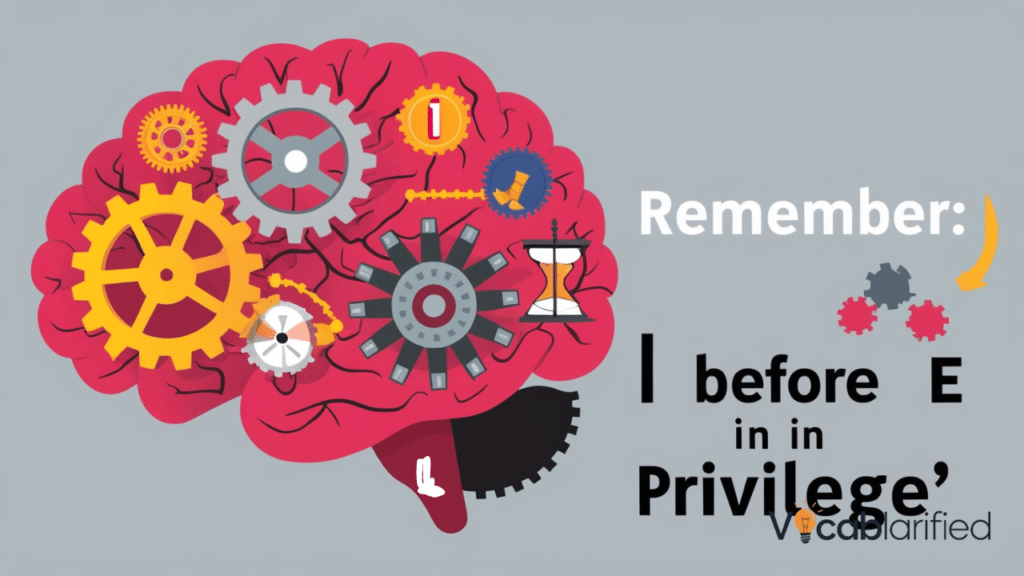
Mnemonic Devices
Create a memorable phrase to help you remember the correct spelling. For example: “It is a privilege to have I before E in this word.”
Etymology
Understanding the word’s Latin roots can help. “Privilegium” breaks down into “privi-” (private) and “-legium” (law).
Practice Makes Perfect
Regular usage in writing can help reinforce the correct spelling. Try incorporating “privilege” into your daily writing tasks until it becomes second nature.
You Might Also Like This: Successfully Or Succesfully: Which One Is Correct
Privilege in Different Contexts
The concept of privilege extends far beyond its spelling. Let’s explore how this word is used in various fields:
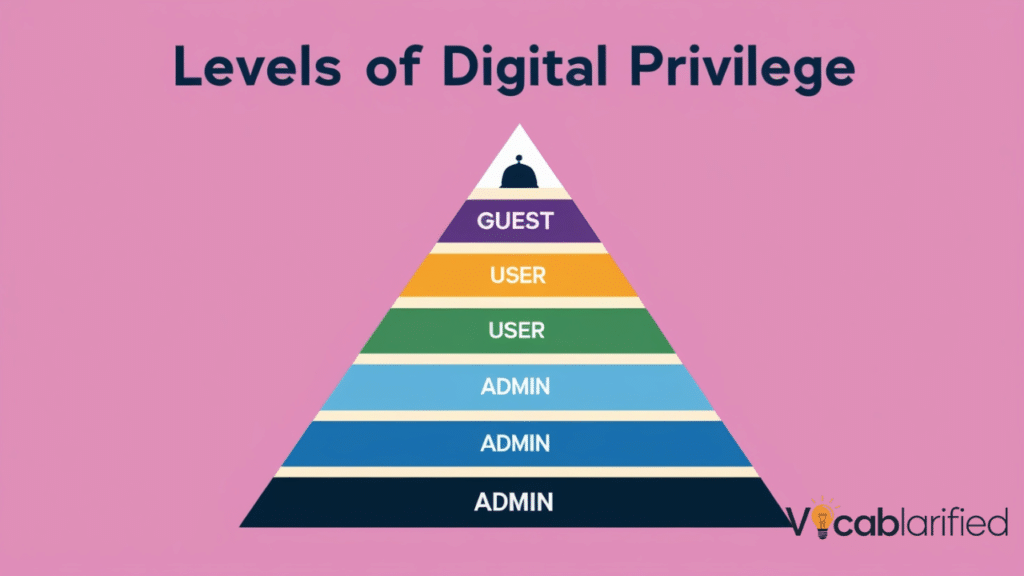
Social Sciences
In sociology, privilege refers to the unearned advantages that some groups in society have based on their membership in a social group.
Law
Legal privilege protects certain communications, such as those between a lawyer and client, from being disclosed without permission.
Technology
In computing, privileges determine what actions a user can perform within a system. Here’s a table illustrating common user privilege levels:
| Privilege Level | Description | Example Actions |
|---|---|---|
| Guest | Minimal access | View public information |
| User | Standard access | Create and edit own files |
| Power User | Enhanced access | Install software |
| Administrator | Full system access | Modify system settings |
| Root | Highest level access | Change core system files |
| Network Admin | Network-wide control | Manage multiple systems |
| Database Admin | Database control | Modify database structure |
| Security Admin | Security control | Set security policies |
| Backup Admin | Backup control | Perform system backups |
| Application Admin | Application control | Manage specific applications |
The Privilege of Knowledge
Understanding the correct spelling and usage of “privilege” is, in itself, a form of privilege. It represents access to education and linguistic resources that not everyone possesses.
Conclusion
In the grand scheme of language, the difference between “privilege” and “priviledge” might seem minor. However, attention to such details can have a significant impact on how we communicate and how others perceive us.
Mastering the correct spelling of “privilege” is more than just a matter of following rules. It’s about precision in communication, respect for language, and the advantage of presenting oneself as educated and attentive.
Remember, language is a powerful tool. Wielding it with accuracy and confidence is a privilege we should all strive to earn and maintain. So next time you’re about to type “priviledge,” pause for a moment and give the correct spelling the respect it deserves.

Emma Carter is an experienced blogger at Vocablarified. She enjoys helping people expand their vocabulary and improve their language skills. With a warm and approachable writing style, Emma makes learning new words fun and accessible. When she’s not writing, she loves reading books and discovering new phrases to share with her readers. Emma is passionate about making language learning an enjoyable journey for everyone.

